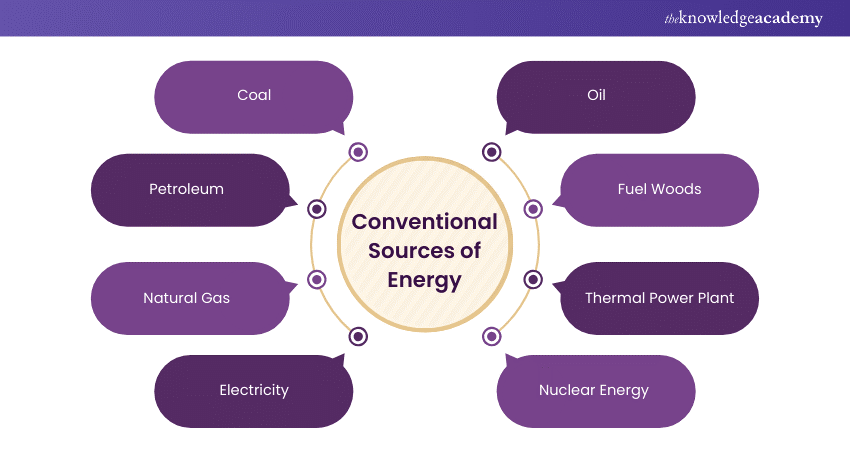We may not have the course you’re looking for. If you enquire or give us a call on +46 850282424 and speak to our training experts, we may still be able to help with your training requirements.
Training Outcomes Within Your Budget!
We ensure quality, budget-alignment, and timely delivery by our expert instructors.

Have you ever wondered how the lights in your home turn on or how your car gets you from place to place? It all comes down to energy! Energy is an important part of our lives, powering everything from small gadgets to massive industrial machines. In this blog, we discuss the Conventional Sources of Energy, such as coal, oil, fuel wood, and natural gas. You'll learn how these sources have fueled our world for centuries, their impact on our lives, and why they continue to be important in our energy landscape today.
Table of Contents
1) What is Energy?
2) Classification of Energy Sources
3) Conventional Sources of Energy
a) Coal
b) Petroleum
c) Natural Gas
d) Electricity
e) Oil
f) Fuel Wood
g) Thermal Power Plant
h) Nuclear Energy
4) Conclusion
What is Energy?
Energy is the capacity to perform work, and it manifests in various forms, such as heat, light, motion, electricity, chemical energy, and nuclear energy Every action we perform basic activities, such as walking to intricate industrial operations, requires energy. The law of conservation of energy asserts that energy can change from one form to another, but it cannot be created or destroyed.
Energy is one of the most vital components of economic infrastructure. In a developing economy, there is a high demand for energy from sectors like agriculture, industry, residential, and commercial. Energy resources are essential for the existence of mankind, as they support growth and development. Without sufficient energy, economic progress would be significantly hindered, affecting the quality of life and sustainability.
Classification of Energy Sources
Energy Sources is divided into two categories: Conventional and Non-conventional sources of energy. This classification helps us understand the various types of energy we use.
a) Conventional Sources of Energy: These are the traditional forms of energy that have been in use for centuries. They are primarily non-renewable, meaning they are finite and will eventually be depleted. These sources have been the backbone of industrial development and are still widely used today.
b) Non-Conventional Sources of Energy: These source, also known as renewable energy sources, are those that are continuously replenished by natural processes. They are environmentally friendly compared to conventional sources.
Gain expertise in energy management with ISO 50001 Training Courses. Sign up now and get certified to improve your efficiency!
Conventional Sources of Energy
Here are some important Conventional Sources of Energy:

1) Coal
Coal is one of the oldest and most widely used sources of energy. It is a black or brownish-black sedimentary rock that is composed mainly of carbon, along with other elements like hydrogen, sulfur, oxygen, and nitrogen.
Coal is used for electricity generation in coal-fired power plants. It is also used in industries like steel and cement production. Despite its widespread use, coal is a contributor to air pollution and greenhouse emissions, making it a less sustainable option.
2) Petroleum
Petroleum, also known as oil, is a liquid fossil fuel taken from underground deposits. It is a complex mixture of hydrocarbons and is used in a variety of applications.
It is advanced into products such as gasoline, diesel, jet fuel, and lubricants. It is also used in the production of plastics, chemicals, and other materials. The transportation sector is heavily reliant on petroleum products, making it a crucial energy source.
3) Natural Gas
It is a gaseous fossil fuel composed mainly of methane. It is found in underground reservoirs, often alongside petroleum deposits.
It is used for electricity generation and heating and as fuel for vehicles. It is also used as a raw material in the production of chemicals and fertilisers. Natural gas releases fewer emissions, making it a cleaner option.
4) Electricity
Electricity is a form of energy that is used to power homes, businesses, and industries. It is generated from various sources, including coal, natural gas, nuclear, and renewable sources.
Electricity is used in countless applications, from lighting and heating to powering electronic devices and machinery. Its versatility makes it an essential part of modern life.
5) Oil
Oil, in the context of energy, often refers to crude oil or petroleum. It is a crucial source of energy and raw materials for various industries.
It is used to produce fuels like gasoline and diesel, as well as products like plastics, chemicals, and pharmaceuticals. It is a driver of the global economy, but its extraction and use have significant environmental impacts.
6) Fuel Woods
Fuel wood is wood used as a source of energy, typically for cooking and heating. It is one of the oldest forms of energy used by humans.
It is used for cooking and heating, particularly in rural and developing areas. While it is renewable, unsustainable harvesting can lead to deforestation and environmental degradation.
7) Thermal Power Plant
It generates electricity by converting heat energy into electrical energy. They use various fuels, including coal, natural gas, and oil, to create steam that drives turbines connected to generators.
Thermal power plants are a major source of electricity worldwide. However, they are also a significant source of pollution and greenhouse gas emissions.
8) Nuclear Energy
It is a powerful source of energy generated through nuclear reactions, primarily fission. It is a non-renewable but low-carbon energy source.
Nuclear energy is used for electricity generation in nuclear power plants. It is a reliable source of energy but poses challenges related to radioactive waste disposal and safety concerns.
Learn how to use an energy-oriented business administration with our ISO 50001 Energy Management Systems Training – Join today!
Conclusion
Conventional Sources of Energy have played a vital role in powering our world and driving industrial progress. However, as we look to the future, it's essential to explore cleaner, more sustainable energy alternatives. By understanding the uses of conventional energy, we can make informed decisions to balance our current needs.
Learn how to improve energy usage with our ISO 50001 Foundation Training – Join today!
Frequently Asked Questions

Conventional energy sources are associated with air and water pollution since they emit greenhouse gases that lead to climate change. They can also result in the destruction of habitat and reduction in the variety of species because of the extraction procedures.

The transition from traditional sources of power to clean and sustainable options is crucial to preserve the earth and offer reliable energy supplies. Companies can use other resources, such as solar and wind energy systems, instead of the conventional resources that cause climate change.

The Knowledge Academy takes global learning to new heights, offering over 30,000 online courses across 490+ locations in 220 countries. This expansive reach ensures accessibility and convenience for learners worldwide.
Alongside our diverse Online Course Catalogue, encompassing 17 major categories, we go the extra mile by providing a plethora of free educational Online Resources like News updates, Blogs, videos, webinars, and interview questions. Tailoring learning experiences further, professionals can maximise value with customisable Course Bundles of TKA.

The Knowledge Academy’s Knowledge Pass, a prepaid voucher, adds another layer of flexibility, allowing course bookings over a 12-month period. Join us on a journey where education knows no bounds.

The Knowledge Academy offers various ISO 50001 Certification, including the ISO 50001 Foundation Training, ISO 50001 Energy Management Systems Training, and ISO 50001 Lead Auditor Training. These courses cater to different skill levels, providing comprehensive insights into Energy Manager Salary.
Our IT Service Management Blogs cover a range of topics related to Energy Management, offering valuable resources, best practices, and industry insights. Whether you are a beginner or looking to advance your Energy Management skills, The Knowledge Academy's diverse courses and informative blogs have got you covered.
Upcoming IT Service Management Resources Batches & Dates
Date
 ISO 50001 Foundation Training
ISO 50001 Foundation Training
Mon 13th Jan 2025
Mon 3rd Mar 2025
Mon 12th May 2025
Mon 14th Jul 2025
Mon 6th Oct 2025
Mon 1st Dec 2025







 Top Rated Course
Top Rated Course



 If you wish to make any changes to your course, please
If you wish to make any changes to your course, please


